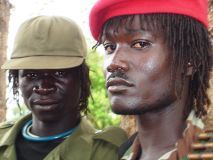LRA not responsible for Sudan’s Equatoria attacks – report
By James Gatdet Dak
March 8, 2008 (JUBA) — In a report presented to the Chief Mediator of the Ugandan peace talks, Dr. Riek Machar Teny, the leader of the Cessation of Hostilities Monitoring Team (CHMT) that monitors the cessation of hostilities agreement signed since August 26, 2006, between the Ugandan government and the Lord’s Resistance Army (LRA) said that LRA forces were not responsible for this year’s attacks carried out in various parts of Greater Equatoria region in Southern Sudan.
 SPLA Major General Wilson Deng Wek issued the statement after he, accompanied by his team, carried out investigations into last month’s attacks on the civil population in Kajo-Keji County in Central Equatoria state by unknown gun men that left dozens of people dead and wounded.
SPLA Major General Wilson Deng Wek issued the statement after he, accompanied by his team, carried out investigations into last month’s attacks on the civil population in Kajo-Keji County in Central Equatoria state by unknown gun men that left dozens of people dead and wounded.
General Deng’s monitoring team is currently composed of representatives from the Sudan People’s Liberation Army (SPLA), the Ugandan Popular Defense Forces (UPDF), the Lord’s Resistance Army (LRA), and one representative each from the African Union observer countries.
The team also spent one week on a fact-finding mission in Eastern Equatoria state where he discussed the general security situation with Chiefs and representatives of returnees in the state, particularly in Magwi County, following allegations in the media that hundreds of LRA forces moved back into the County from Rikwangba Assembly Area in Western Equatoria state.
Among the Bumas and Payams the team visited included Nimule, Opari, Jebeleen, Palataka, Panyikuar and Owinykibul. The local populations in these areas refuted the allegations and told the Monitoring Team that there were no any LRA forces in the areas.
The team also met with the Magwi County administration at the County headquarters in Magwi town who also confirmed that there were no LRA forces present in the County, adding that their County citizens previously displaced by the LRA activities in their respective areas before the Juba peace process were now returning to settle peacefully in their Bumas and Payams.
The local populations in the areas visited by the team, however, complained to the team against who they described as cattle-keepers who were not part of the indigenous populations and caused some problems in the course of their attempt to resettle in the areas.
The local populations also complained about lack of basic services such as clean drinking water in their areas.
The investigation report by the Monitoring Team could not disclose to the media who was responsible for the Kaji-Keji County attacks on the civil population, which strangely coincided with the resumption of the Ugandan peace talks in Juba after several months of adjournment.
In July 2006 when the Ugandan peace talks were launched in Juba, intensive attacks were carried out by unknown group on the civil population in the outskirts of Juba town, particularly around Gumbo areas on the eastern bank of the river Nile almost on daily basis.
The general feeling of the population in Juba was that the LRA forces carried out those deadly attacks, despite the LRA’s denial to the accusations, until the SPLA forces encountered the attackers, killing two of them and capturing fifteen others.
Instead, the culprits were identified to be members of the Sudan Armed Forces (SAF), eight of them identified to be from the SAF Engineering Corps Unit and seven from various units at the former SAF General Headquarters in Juba.
The Kajo-Keji County attacks also triggered accusations and counter-accusations between the LRA and UPDF.
The leader of the LRA peace delegation, Dr. David Matsanga, told the press that the UPDF had made recruitments from communities that speak Acholi, Madi and Teso and organized them under what he called ‘Brigade 105’ under the command of former LRA officers who defected to the Ugandan government in order to destabilize the area while acting like LRA bush soldiers so that the attacks are blamed on the LRA.
The UPDF denied the LRA accusations, saying it was the LRA forces that carried out the attacks.
The Minister of Internal Affairs in the Ugandan government and head of the government peace delegation, Dr. Ruhakana Rugunda, said the LRA accusations were not acceptable. “We should wait until we hear a final report from the CHMT,” he said.
Others speculate that some Southern Sudanese citizens might have organized themselves into bandits to carry out such attacks to loot properties while others suspect some disgruntled SPLA soldiers in those areas of attacks who did not receive salaries for several months.
Earlier during the signing ceremony of the Permanent Ceasefire agreement between the two parties, former President of Mozambique and Special Envoy of the United Nations Secretary General for the LRA affected areas, Joaquim Chissano, warned the parties to remain vigilant of peace spoilers.
The UN Special Envoy said there are those who may not be happy with the achieved peace in northern Ugandan and may want to spoil it. He said this hard-won peace is for the people of Uganda and they should not allow any body to spoil it.
A Final Peace Agreement is expected to be signed in Juba by both President Yoweri Museveni of Uganda and Joseph Kony of LRA/M at the end of this month, which will then trigger its implementation process.
(ST)
